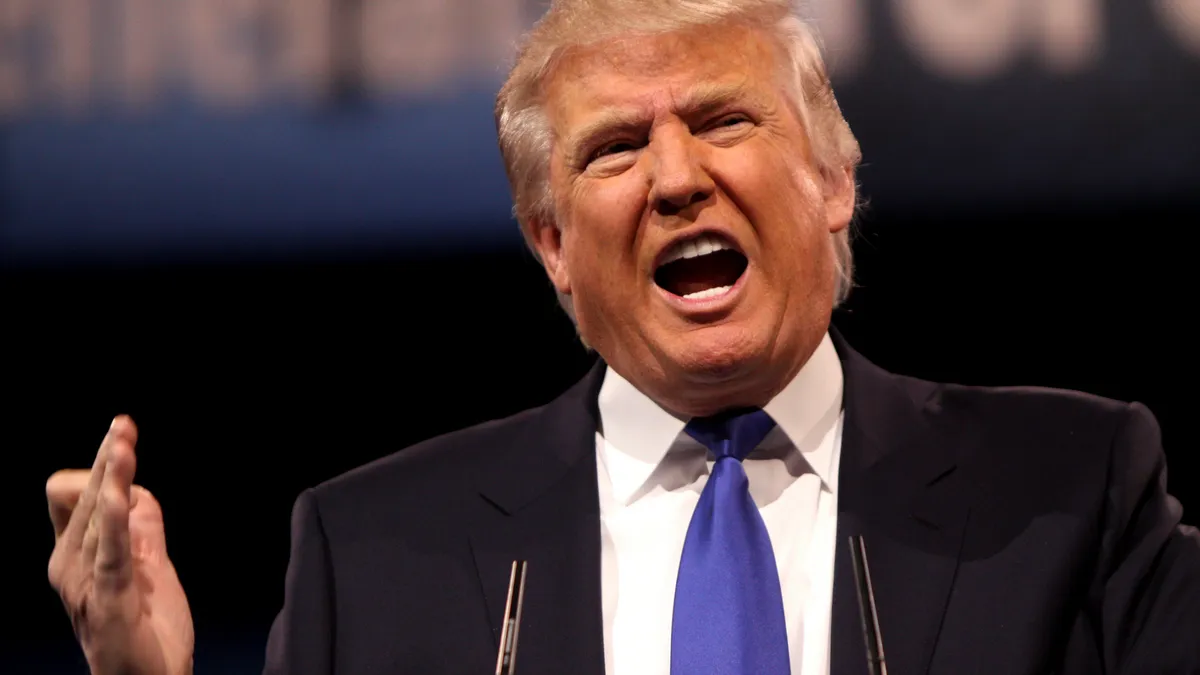Dive Brief:
- Following several media reports that the new Trump administration has been preparing to roll back energy and environmental restrictions put in place by President Obama, The Washington Post now reports the actions will target power plant emissions, coal production and clean water rules.
- One executive order will direct the U.S. Environmental Protection Agency to begin rolling back the Clean Power Plan, while others will address coal production and federal water, the Post reports. The orders are expected as early as this week.
- Newly-confirmed EPA Administrator Scott Pruitt yesterday told employees of the agency that he is ready to work with them, but the former attorney general of Oklahoma also stressed the agency would have a respect legislation as it is written and will focus on maintaining market certainty.
Dive Insight:
With Pruitt now installed at the EPA, the Trump administration is widely expected to begin the work of undoing eight years of Obama policies that focused on restricting fossil fuel use in the power sector and cleaning up the environment.
The Post reports the first orders will focus on undoing the Clean Power Plan, loosening coal leasing rules for federal land, and addressing federal jurisdiction over some wetlands. And the U.S. House has passed a bill to do away with the U.S. Bureau of Land Management restrictions on methane releases from oil and gas drilling, another target of the Trump administration.
Eliminating Obama's signature climate rule was a campaign promise for Trump, along with other pledges to roll back regulation and empower fossil fuel mining and use.
Pruitt, in his first comments to the agency he will now lead, tried yesterday to assuage some fears that his vision for the EPA may contradict the mission of the agency to ensure clean air and water for citizens. He characterized himself as a "good listener," and condemned the "toxic" political environment of recent years. But his comments also seemed to leave little doubt that he will continue to fight for less federal intervention into state energy and climate decisions.
"I seek to ensure we engender the trust of those at the state level, so they see us as partners and not adversaries," Pruitt said. He also stressed the importance of "process, federalism, and rule of law."
Even if Trump rolls back the CPP and coal rules, significant questions remain for the agency. The Supreme Court has ruled that the EPA must regulate carbon as a pollutant under the Clean Air Act, but that obligation is contingent on the agency's 2009 endangerment finding, which holds that greenhouse gases are a public health threat.
If the Trump administration views the science underlying that finding as illegitimate, it could seek to challenge it in court or push Congress to amend the underlying law. Pruitt hinted this weekend in an interview that he thinks Congressional action may be needed, telling the Wall Street Journal he is unsure whether the agency has the "tools" to regulate carbon from the power sector.
Any court challenge against the endangerment finding would be an uphill battle, energy lawyers say, because Pruitt’s EPA would have to prove that GHGs are not a public health threat. But the nominee has shown appetite for the fight before, signing onto a legal challenge to the finding in 2012.
Though that suit was thrown out, the Pruitt EPA could have an advantage in future challenges due to judicial deference — the legal concept that courts should allow federal agencies wide leeway to make regulations, so long as they do not explicitly break the law.
The concept was one of the key points in the D.C. Circuit Court’s hearing on the Clean Power Plan last year, with a number of energy lawyers saying they expected the court to defer to EPA's authority on the plan. The court has yet to rule on the legality of the Obama-era rule, but Pruitt's EPA is expected to rescind it if it is upheld.














